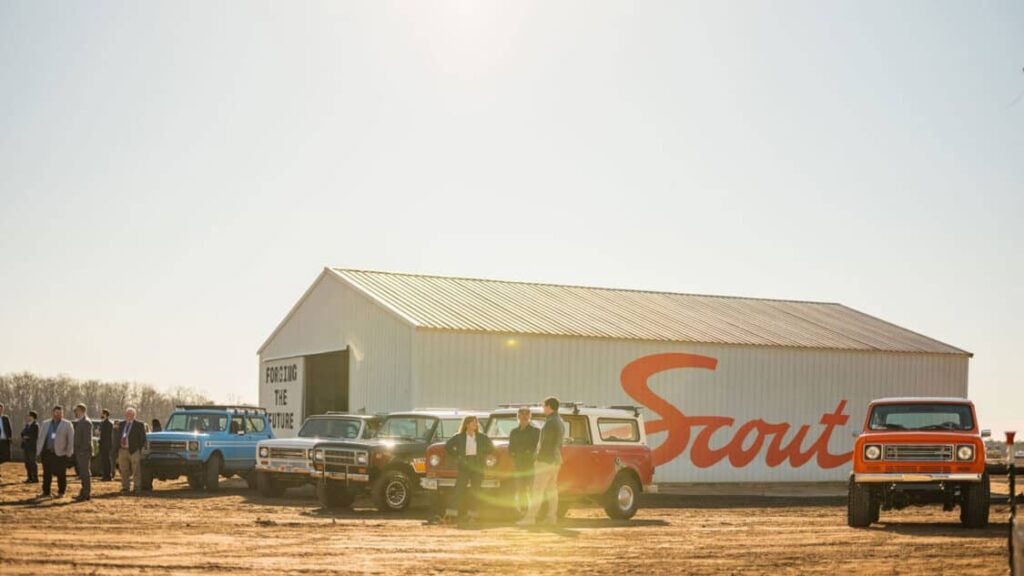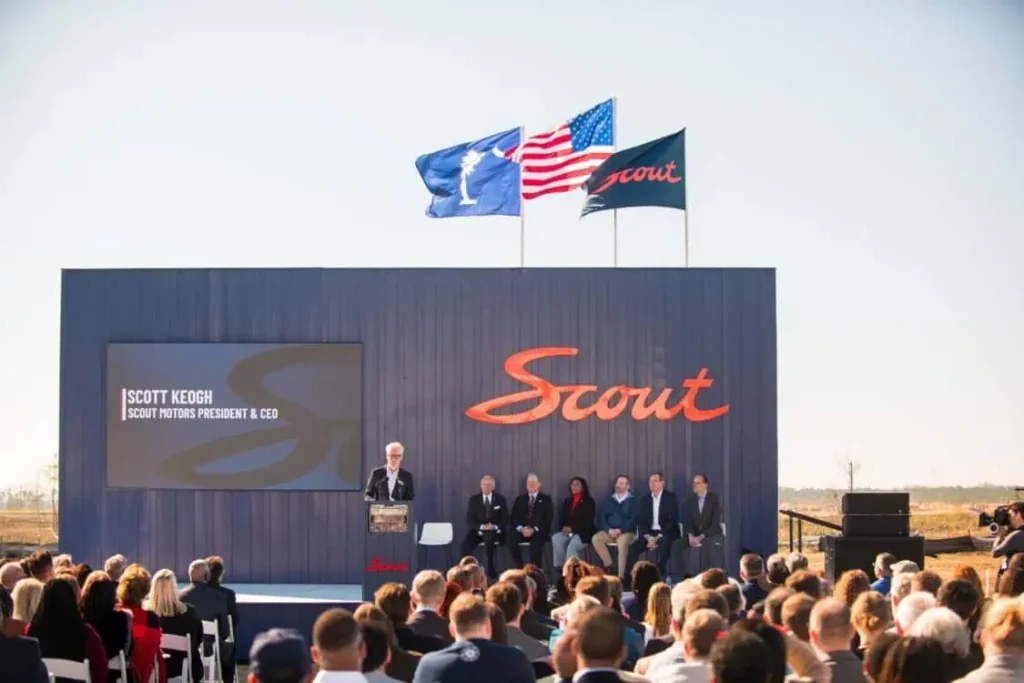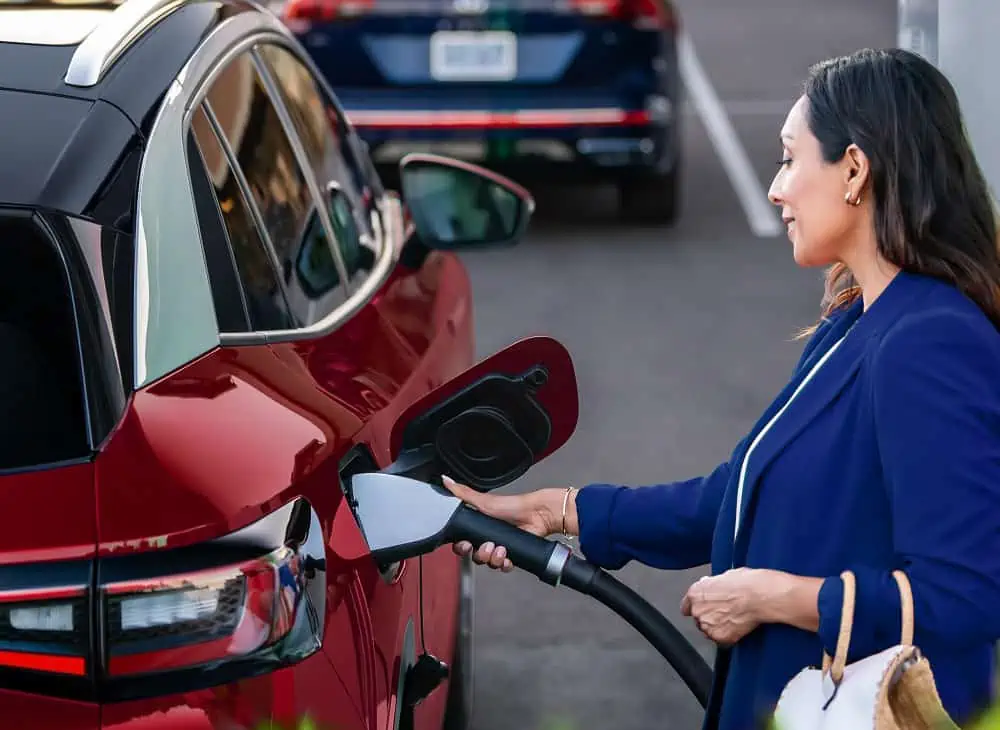Scout Motors’ EVs Revive Iconic American Brand, With New South Carolina Factory
The Volkswagen Group, Scout Motors’ parent company, resurrected the Scout as an EV-only brand and as a ground-up effort to make vehicles designed and engineered for the American market. Recognizing America’s love affair with the truck and SUV, it is a move destined to succeed, according to industry analysts.

Scout Motors is investing over $2 billion and expects the Scout electric SUV and its electric trucks to enter production in late 2026. The Scout was originally manufactured by International Harvester. VW acquired International Harvester’s successor company, Navistar, in 2020.
Scout Motors’ Future 1,600-Acre Factory in South Carolina Makes a Huge Impact

Scout Motors’ future 1,600-acre electric truck and electric SUV factory in Blythewood, South Carolina, is very important for South Carolina and the U.S. It’s important for South Carolina as the largest development in the region’s history. South Carolina is becoming a center for vehicle production, as Scout follows Volvo and BMW into the state.
Scout’s factory is projected to have an astounding $4.2 billion economic impact. It is estimated to create over 4,000 jobs, producing 200,000 vehicles annually. The South Carolina Legislature approved a $1.3 billion tax incentive plan for the Scout factory last spring, with the assurance that Scout would create thousands of local jobs.
Scout Motors’ Interesting History
Between 1960 and 1980, the Scout was originally built by Illinois-based heavy equipment manufacturer International Harvester. As one of the first American SUVs, it was a ground-breaking design at the time.
The first International Scout was introduced in 1961 as a small, two-door SUV with a raised, boxy design. The International Harvester Scout was intended to compete with Jeep, featuring a rugged look and a fold-down windshield. It was released way before other well-known 4x4s, like the Ford Bronco, and remains very popular among off-road enthusiasts and classic car collectors today. These fans of Scout are eagerly anticipating Scout’s new EVs and are expected to purchase them in large numbers.
Scout’s Future Plans Include Qualifying for the U.S. Federal EV Tax Credit
VW Group’s new Scout EV factory is designed to take advantage of U.S. tax incentives and features a new body-on-frame truck platform built from the ground up. The Scout models could start in the high-$40,000 range, said Scout’s CEO, Scott Keogh.
Scout’s EVs are designed for rugged off-road adventures. The vehicles are planned to have locking differentials, lots of accessories, and physical buttons instead of screen controls, completing the retro look and feel. VW hired contract firm Magna Steyr, maker of the Mercedes G-Class, to make the vehicles off-road-ready. Scout’s models will not be offered as hybrids.
It’s unknown where Scout’s batteries will be sourced from at present. Keogh said they won’t come from SK Innovation’s Georgia plant that supplies power cells to the Volkswagen ID.4.
Scout will have dealerships, but they will not be attached to Volkswagen dealerships, Keogh said. It’s unclear if Scout will adopt direct sales, but it’s unlikely since that would cause controversy with the VW dealers. Scout may adopt fixed prices and sell online, such as Hyundai’s announcement that it would sell vehicles on Amazon.com, beginning in 2024. Hyundai’s online sales haven’t begun yet as of February 2024, but when they do, experts expect many other OEMs to follow suit.
The Volkswagen Group’s Tough Competition

Volkswagen and other carmakers are facing intense competition from Chinese EV brands, most notably BYD. BYD concluded 2023 with record-breaking sales volume, surpassing its 3 million annual sales target to become the global new energy vehicle sales champion for the second year in a row. As BYD and other low-priced Chinese EVs take over the global market, Volkswagen and others are feeling the pain of decreased sales.
VW is the globe’s second-largest automaker after Toyota, but it has not achieved Toyota’s success in the U.S. VW has about 25% of the new car market in Europe and roughly 14% in China. In North America, VW’s auto market penetration is a low 4%. VW was one of the first foreign brands to enter the American auto market, but since it never produced the ever-popular big trucks and SUVs that Americans love, it never had great success in America. It’s made respectable profits from luxury divisions Audi, Porsche, and Bentley, but with VW Scout, it’s counting on a significant entry into becoming competitive in the U.S.
Scout is to be commended for its forward-thinking plan of resurrecting its iconic brand as an electric-only brand. As the world moves from gas-powered internal combustion engine vehicles to more eco-friendly electric vehicles, Scout is future-proofing its vehicles for the long term. Analysis by Bloomberg NEF states that the global market for internal combustion vehicles peaked in 2017 and has declined every year since. According to Atlas Public Policy, the U.S. EV market share reached 12% in December 2023, a new record.

Electric Vehicle Marketing Consultant, Writer and Editor. Publisher EVinfo.net.
Services